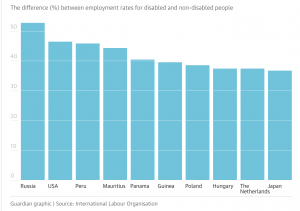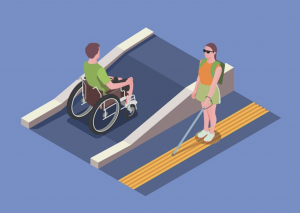by Daniel Andrews | September 5, 2023
Despite being the world’s largest minority group, people living with disabilities are often forgotten about and subjected to cruelties in some parts of the world. In countries that don’t guarantee rights to people with disabilities, some citizens are barred from attending school, voting, and getting married. At its worst, some countries see disability as a “spiritual sickness” with physical violence as the only way to heal such individuals.
The Problem
Every day, people with disabilities go through struggles, both major and minor, that make their everyday lives more difficult than those of persons without disabilities.
From figuring out how to get into a building without a ramp to being treated with disrespect when checking out at the grocery store, people with disabilities of all types live a reality that the rest of us cannot understand.
What makes the lives of this group of people even harder is when their government does not help to level the playing field. People with disabilities often have to put more money towards healthcare and education, and many don’t have the financial assets to do so. Likewise, poor public works can make accessibility notoriously difficult, and opportunity for employment is vastly reduced for those with disabilities.
In fact, only 18% of the 193 constitutions guarantee the people with disabilities the right to work. Similarly, 26% of these guarantee the right to healthcare, and 28% guarantee education. Some even outlaw them from voting or getting married. While the treatment of people with disabilities in the United States is comparatively OK, there still exists a stigma in our country that thwarts many attempts for people with disabilities to climb the ladder and injustices remain worldwide for those not in the states.
A Brief Humbling of the United States
Many Americans assume that the United States is a model for how everything should be done, including the treatment and quality of life for people with disabilities.

Countries with highest unemployment gaps between able-bodied persons and persons with disabilities. Credit: The Guardian
The reality, however, is that the US has the second highest employment gap for persons with disabilities coming in only behind Russia. And, since the 1980s, employment rate for this group has continuously fallen with only 34% of citizens with disabilities employed in 2014 compared to 75% of citizens without disabilities.
Many would be shocked to learn that the population of people with disabilities is the largest minority group that exists, and some may even be surprised to learn that they are labeled a minority group at all. These all point to the fact that citizens with disabilities do not get nearly enough support or recognition, even in countries as developed and progressive as the United States.
On top of this, students with disabilities perform an average of three years below their peers without disabilities, a statistic that points to vast inequities to access of educational tools and resources. The stigma that exists points the blame too quickly to the students themselves, when in fact much more could be done to level the playing field.
Countries That Soften the Blow

A clip art image of a person going up a ramp and a person using a mobility cane
A few countries stand out as models for how persons with disabilities should be treated. One of these is the Netherlands, which is an example for fighting back against low employment rates amongst people with disabilities in their community.
According to the US News and World Report, the Netherlands enacted a policy back in 2002 that required employers to show proof of an effort to “accommodate and rehabilitate” their workers. The country has vastly reduced the number of people receiving disability benefits by focusing the reform on getting them jobs, rather than paying them on unemployment. This not only helps their financial situation, but provides a boost in moral and mental health.
In addition, the entire public transportation system in the Netherlands is wheelchair accessible. Persons with disabilities can also download apps on the government’s website showing wheelchair-accessible routes to all destinations. Small things like these help ease the pain of having a disability in a world oftentimes not accommodated for them.
Germany, whose capital city has been a winner of the EU Access City Award, is another example of a country that shines in how they treat persons with disabilities compared to the rest of the world. All children with disabilities are automatically insured with no costs to their parents. The public transportation system, in addition to being accessible in all facets, is free to all persons with disabilities. They are also entitled to accommodations such as a sign language translator or wheelchair access to schools free of charge. German corporations also receive tax breaks for employing people with disabilities, which serves as an incentive for boosting employment.
Which Ones Have Work To Do?
Several countries, particularly those in the developing world, have a long way to go in reaching the level that countries such as Germany or the Netherlands are on. For example, people with disabilities in Ghana are mistreated, and the belief that a disability is contagious, ie., that you can “catch it” from a person with a disability, is commonplace.
In countries like these, where abuse is typical, equal opportunity for education, employment, and healthcare for populations with disabilities is essentially an afterthought. According to Hannah Kuper from The Guardian, “many, if not most, of disabled children are not enrolled in school in developing countries”.
Clearly, work needs to be done worldwide to get these countries at least to the surface of the water, because their constituents with disabilities are drowning. While certain initiatives are being taken, such as Rwanda’s Quality Basic Education Program or Montenegro’s quota of persons with disabilities in a company, we’re still a long way off from universal equity for persons with disabilities.
Frenalytics and the Global Childhood Academy

The Global Childhood Academy Symbol. Credit: The Global Childhood Academy
Frenalytics is one of the leaders in the world’s efforts to do this. Its interactive learning platform makes the aforementioned tribulations and burdens of having a disability a little less tiring by providing effective accommodations and tools that their governments and societies fail to provide. Frenalytics is committed to working within the States and globally to bridge the education gap and make accessible education a possibility for all people.
To supplement these efforts, Frenalytics made a new partner with the Global Childhood Academy (GCA) last year.
The GCA is an AI-based platform that works to improve the skills of educators in a commitment to ensure quality education for all children, everywhere.
Frenalytics can now offer its content in Arabic, Hindi, and a plethora of other languages in order to promote wider access to quality education worldwide. The project of special education does not only apply to those within arms reach – children around the world with the same disabilities are not granted equivalent access and accommodations as more fortunate ones.
While strides are being made by Frenalytics and other platforms to enhance the well being of the world’s largest minority, there is still plenty of work to be done. It’s often easy for individuals without disabilities to forget, either intentionally or unintentionally, about the plights and tribulations of persons with disabilities around the world. Resources that can sometimes be taken for granted, are luxuries for many persons with disabilities.
Let’s expand our empathy and level the playing field worldwide, one step at a time.
FrenalyticsEDU is a patented, cloud-based interactive platform designed to personalize the learning process for students with unique learning needs, including autism and Down syndrome. The first version of Frenalytics was created by CEO Matt after his grandmother suffered a massive stroke during open-heart surgery. Designed for educators by educators, FrenalyticsEDU helps students learn life skills and academic concepts in a fun and engaging way, and helps teachers & parents easily measure IEP goals through our interactive progress dashboards. Want to see how FrenalyticsEDU helps students with special needs live more independent lives? Sign up for FrenalyticsEDU Free! FrenalyticsEDU named winner of Best New K-12 Solution in the prestigious 2023 Supes’ Choice Awards by the Institute for Education Innovation (IEI)!
FrenalyticsEDU named winner of Best New K-12 Solution in the prestigious 2023 Supes’ Choice Awards by the Institute for Education Innovation (IEI)!
Click here to learn more, or give us a call at (516) 399-7170.
Dan Andrews is a Junior at Boston College studying Finance and Philosophy. His time at Frenalytics has helped him gain a clearer insight into the needs of persons with disabilities and the importance of an effective learning process. Dan enjoys skiing, hiking, reading, and spending time with his friends and family. Contact Dan: dan@frenalytics.com

